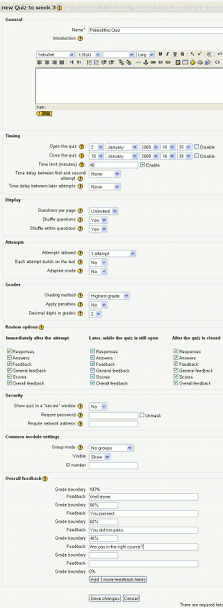I was just reading this criticism of Moodle, and the thing that strikes me about Bryan Ollendyke's criticisms are the reactions of a software geek. They are also very familiar. I had a similarly horrified reaction the first time I saw the Moodle code (and got into trouble with my boss at the time for speaking my mind at an inopportune moment ;-)) and three and a half years later the same criticisms still apply.
But what I have come to learn over the last three and a half years is that it does not really matter. That is somewhat humbling. I am a professional software developer. I have worked hard to learn to write good code; to build and appreciate elegant and powerful software architectures; to design usable interfaces with modern UI idioms; and so on. However, as I say, that seems not to be very important. Teachers all over the world use Moodle to create great (and ordinary) learning experiences; teachers who move from other learning management systems tend to like Moodle better than whatever they were using before; and all sorts of people from all over the place seem to be able to write plugins. All that, despite Moodle not being a text-book example of software design.
So, are Bryan and I and others with similar opinions just software engineering snobs? Well, probably yes, up to a point, but it is our job to care about these things. Other things being equal, we should do things the right way. The point is that some of the other things are much more important than the cool (or not) technical things going on behind the scenes. The most important thing is education. Moodle's genesis was in Martin Dougiamas's postgraduate studies of online education; but more important is that the Moodle project, led by Martin, has always focussed on engaging teachers, as well as developers, in the Moodle community. To use the HCI jargon, Moodle has always practiced user-centred design.

Now, if you are an expert in HCI design, and you have seen parts of Moodle like the quiz settings form (screen-shot right), then that last sentence might make you laugh. That form is a typical long Moodle form with a million fields you can fill in. In the technical details it does not follow recent user interface best practice. However, suppose you really want to simplify it. The best approach would be to find some options that nobody really needs, and remove them. Well, believe me, I have tried on several occasions. I have convinced myself that some feature is pointless and posted in the quiz forum. Of course, I quickly get a lot typical 'How dare you! I love it that feature. I'll throw my toys out of the pram if you remove it.' responses. Then, invariably, someone will make a well reasoned post that explains a compelling educational situation where that feature really makes a difference, and I will realise why that feature was added in the first place, and why it would be a mistake to remove it.
That is the thing. All those features that bloat the interface are there because someone wanted them badly enough to implement them. Even if they were not a professional developer, and even if their code is not first rate. On the whole, it is probably better for Moodle to have those features than not, even if that means that the interface is not great. We are not here primarily to build beautiful interfaces. We are here to let teachers build beautiful learning experiences. Of course, that is not an excuse to just ignore defects in the interface. We should, and do, go back and apply HCI know-how to improve the interfaces of existing features; and these days we do try to think about UI design for new features before we implement them. We are learning.
To reiterate my main points in summary: While we developers should strive to do the best job we can, technically, we should not be snobbish about it. We must remember that the most important people for Moodle are the teachers and learners, and it is our job to serve them. We should not reject contributions from people who know lots about education, even if they do not write code as well as we do.